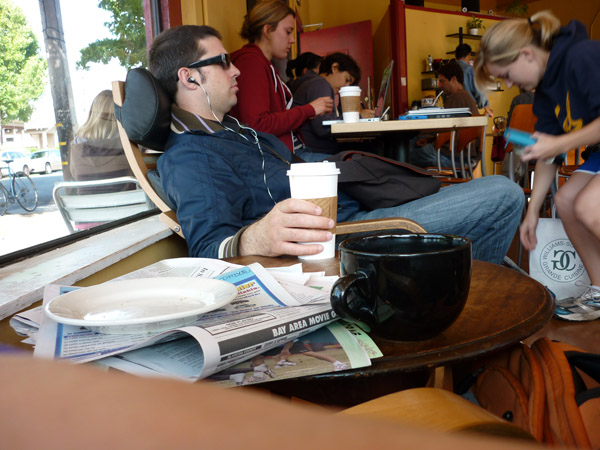Earlier today I strolled down to my local corner cafe for my morning coffee and croissant. The place is usually a reprieve from the morning blues, not just because of its personable staff and rich java beans but because there’s always a pretty groovy music mix streaming from the owner’s iPod that’s hooked to a small speaker on the edge of the counter.
However, when I walked in today it felt more like a funeral. The big frown on the face of the owner (who I will call Carlos) was matched only by what sounded like a medieval church service, more likely a Schubert or Tchaikovsky tune. “They came by and told me the only music I’m allowed to play in here has to be older than 100 years,” he said in a dejected voice. “I’ve been getting letters from them threatening to sue me if I don’t pay the $1500 per year for playing background music in here.”
“Who is ‘Them?'” I asked. As he was trying to recall the name of the entity in pursuit of more money than he could possibly afford, it dawned on me. “BMI?” I ventured a guess, to which he replied, “yes, that’s it!” I remembered a similarly strange squabble from years ago where Skip’s Tavern was sued for copyright infringement because musicians were playing cover tunes and a more recent article about a 55-seat coffee shop in Missouri with occasional live music that got hammered by all three Performing Rights Organizations (PRO), BMI, ASCAP, and SESAC. In this case though Carlos was getting “lawyered” for playing some background music at his local spot, which I hadn’t heard of before. I’m pretty sure that every single cafe, bar, or restaurant I’ve ever been to has had some musical ambiance.

making it work for everyone is a balancing act
Remembering that some of my own tunes were actually registered with BMI in the prehistoric digital 1990s, I suddenly felt like I had a stake in this, both as an artist who likes the idea of getting compensated for the thousands of hours spent writing and recording songs (though I’ve never seen a penny from BMI for some of the college radio play Chemystry Set got), and as a regular at my local spot who enjoys some nice canned flamenco or jazz with his egg sandwich.
Carlos pulled out the reminder notice that the PROs had sent him. The multi-page document that looked like an IRS tax form listed the date and time of several musical infractions that must have been collected during multiple unannounced visits. Aside from the creep factor of having BMI inspectors go around corner cafes across the nation auditing every hole in the wall’s playlist, the three questions that immediately came to mind were:
- How can these licensing fees be so out of scale?
- Where is the public education about these fees for small restaurateurs unfamiliar with the music industry?
- Why does the enforcement have to be done in such threatening fashion?
Carlos doesn’t have a problem paying a fair share to songwriters. It’s just that when your main business is selling two dollar cups of coffee in an intimate establishment in a city with a $15 minimum wage, $1500 for some background music is really out of your budget. And that’s just BMI. If ASCAP and SESAC have similar out of proportion fees, you’re talking about almost 5k a year for legally running your iPod at a neighborhood spot! In a business with that tight of a margin there’s no way you can stay afloat.
In fact, Carlos thought that the $10 a month he happily pays for his Spotify subscription already covered the artists, which brings me to my second point:

How many of these do you need to sell to pay $5000 in music licensing fees?
How are you supposed to know the difference between the record company’s cut and the composition publishing license if you’re spending 14 hours a day going shopping, scheduling staff, and pouring coffee? If the license fee were included in the Spotify or whatever other account for, say, $20 a month, nobody would have to worry about this stuff and BMI could save loads of money by not having to pay music cops snooping around cafes. But can you really fault an unsuspecting small business owner for dismissing an out-of-the-blue $1500+ penalty threat as a bad practical joke?
I told Carlos that there has to be a way for people like him to be able to play music in his establishment without going bankrupt. So I downed my cuppa joe and walked home to do some browsing on the old interwebs. Within 5 minutes I had found exactly what Carlos was looking for but couldn’t find because he didn’t know what exactly to search for.
My first search was for a Creative Commons collection somewhere that would allow him to play music at his establishment for free and perhaps give lesser known artists some exposure. The Free Music Archive seemed like a good place to start.
Next I searched for “background music for businesses” and I came up with a service called Jamendo that offers a certified license for restaurants to play any music in their library starting at $49 a year.
Since Carlos had used Spotify, I checked if they perhaps had a special business license, but to no avail. So I checked with Pandora, and behold, for $24.95 plus a one-time $99 fee to download a special player you can get a Pandora for Business subscription.

it’s that easy to support musicians within a small business budget. Why doesn’t BMI tell people about that?
In between, I also found that these lawsuits are hitting restaurants all over the country, so at least Carlos’ cafe is in good company.
I went back to Carlos with these three options, and guess which one he was psyched about? That’s right, the most expensive one, Pandora, which I presume will benefit songwriters the most. He’s going to call them up to make sure it’s all kosher, and if so, get on board for $300 a year, plus the initial investment for the player. Being the huge music stream giant Pandora is, I’m assuming that this is a licensing deal that they’ve worked out together with the PROs.
Which leaves us with the fifteen hundred dollar question:
Why do BMI, ASCAP, and SESAC keep going around threatening and suing small businesses that are very much willing to pay their fair share when they know there is a more affordable alternative for these establishments to be PRO compliant? Why couldn’t they just say, “look, here’s what our licensing fees are that you have failed to pay. However, we understand you’re a small business with limited means, so here’s a more affordable route you could take to become compliant that works for both the songwriters and your budget. If you sign up with one of our PRO-licensed streaming services within x amount of time, we will stop bugging you.”
Is it because the inspectors and lawyers need to be kept employed?








Interesting!
I wonder if BMI is looking to have its own independent revenue stream in addition to the licensing fees they get from the likes of Pandora. They seem to be doing quite well – http://www.nytimes.com/2014/09/19/business/media/bmi-reports-a-record-977-million-in-revenue.html?_r=0 Once an organization creates a considerable sales force, it takes on a life of its own playing home to aggressive sales managers and directors.
Here’s an exemption I found online – In general however, if your restaurant is less than 3,750 square feet and you have only one TV with a screen size smaller than 55 inches, you’re probably exempt if you meet all other criteria. Please review the specific details on the radio and TV exemption above before deciding not to license. Source: http://www.restaurant.org/Manage-My-Restaurant/Operations/Regulatory-back-office/11-questions-about-music-licensing
It’d always about the money!
Interesting. Informative (I never knew). Eye-opening. And a classic example of the good things that come from a community-minded relationship, one in which a guy TALKS to the owner of a local place he visits regularly and is invested enough in the place’s success to do some research to help him out. Kudos, Sven.
Thank you, Sven, for clearing some of this up.
Do you have any insights for small restaurant venues where a customer or traveling musician gets up and plays (or sings) a couple tunes? What if they sing songs that they have written themselves?
Hi Keith. Thanks for checking in. Regarding live music, I’m pretty positive the issue is with cover songs only. From what I understand if even just one cover gets played by one performer, no matter how obscure the song or how small the venue, then the venue is technically obligated to pay all the music publishers’ licensing fees. At least that was the case a few years ago when I was more up on this. It may be worth doing some research to if maybe some compromise has been reached in regards to these small venues with only occasional and casual performances.
Can you help me. What about a space with live music (jazz) twice monthly (total of 6 hours), nothing sold, no entrance fee (donations if desired), capacity – 35. I do pay the musician (at a years loss of ca $4000). I do this for the community and to help keep jazz alive (self-interest…I’m a jazz musician). BMI just contacted me and ”offered” $332 yearly. Is there any way to try and lower that, as I assume ASCAP and SESAC will also be contacting me, which will bring the yearly total to ca $1000? A lot for me, as I’m already doing this at a loss, and as a jazz musician, my income ain’t great! an ”unofficial” non-profit community art endeavor. Thanks!
Hi Jesse, thanks for checking in. Unfortunately I don’t really have a good answer to your question. Not really sure what you can do to soften the blow once they “found out” about you. The last time I looked into this around the time I wrote the post they didn’t seem to be flexible at all when it comes to burdening small venues like yours with disproportionate charges. It’s worth asking them though if they could reduce it to something you can afford.
I’m friends with a local bar owner in a pop 200 town on the prairie and they’ve been getting the pay to play “suggestion” from one of the groups. They chose to stop all music completely…and have. Not because of the fee but because there’s absolutely no way that anything they pay will ever get back to, say, Johnny Horton’s estate…even if that was all they ever played. Someone is getting some big money coming in and I’d like to see how it ever gets payed back out. Of course this also has the effect of limiting where local bands can play and get started…but that’s just part of the unintended consequences.
I own a small cafe deli less than 50 seats sesac is after us for $450 a year and I have to sign a contract that has a very vague out clause. Meaning if I decide to stop playing music they can continue to invoice me at their will. Unless I can prove you’re not playing music. Then I have to go to the expense and trouble to prove to them while they continue to invoice me and threaten me. Modern-day Mafia!
Recording Companies are the ones getting paid. The price you pay when lawyers get involved.
ascap and BMI have found a work around to still threaten and sue small business with legit Pandora / Mood Media / commercial accounts. Its called enhanced use, if you have a trivia night or bingo etc (not even music related things) they claim that you are not covered and still need to pay for a separate license fee.
Thanks for the info, Chuck. I like that this thread is turning into a good resource for people affected by this.
We just got a notice from a collection agency on behalf of BMI. We own a small coffee shop and can’t afford BMI, ASCAP & SESAC. We have live music a few nights a week. Our artist play for tips as we have no money to pay them. We just provide a place for these folks to play. Do we have any options other than stopping music all together?
So sorry to hear about this, Gary. It just seems so petty and unfair to go after small fish like you. The easiest solution would be to encourage your artists to only play their original material. Alternately, try to negotiate a fee that’s doable for you. ASCAP’s site for example says that their licensing fees are flexible and that smaller operations may pay as little as a dollar or two a day, which of course also translates to 100s of dollars a year, possibly multiplied by the 3 organizations.
i have close to 10 hours worth of music,i have played it at a coffee shop but was told i couldnt play it due to the shop didnt have the ascap or bmi lic. this has no bearing on me because if im the composer and im playing it in public im not violating any copyright laws so this business shouldnt get bothered by anybody. the issue is when i play someone elses music then i can or the shop can get into hot water with the music police over not having their licences in place.